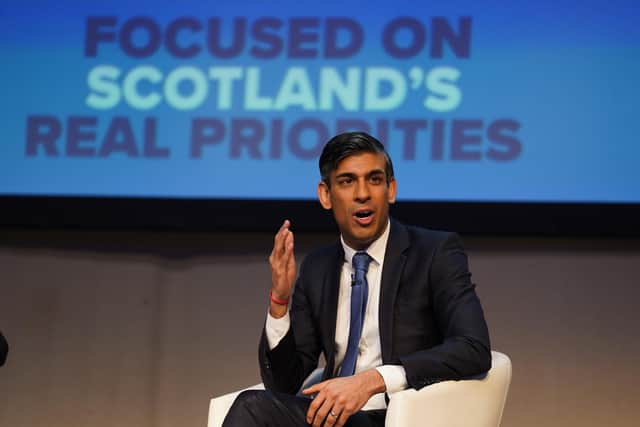SNP's shattered myth of moral superiority creates a chance for a new kind of national pride – John McLellan
MPs John Nicolson and Alyn Smith, John Mason MSP, and former solicitor general Alison di Rollo – who formed a formidable debating duo with Mr Nicolson – all trudged through the Beaton Road gates, as did former Scottish Conservative leader Jackson Carlaw, although not as a pupil but chair of governors when young Humza was on the roll. The man who successfully masterminded Alex Salmond’s defence, solicitor David McKie, is an old boy, as is the unseen hand who edits The Scotsman's comment pages, Ian Johnston. And, ahem, me too.
If anywhere should lay claim to the title, it’s the High School of Glasgow, having produced two 20th-century Prime Ministers in Henry Campbell-Bannerman and Andrew Bonar Law, but perhaps Hutchie’s most famous son is novelist, Unionist MP and Canadian Governor-General John Buchan, even though he apparently didn’t have much affection for the place, describing his time at the old Crown Street school as “a minor episode”.
Advertisement
Hide AdAdvertisement
Hide AdIt is, however, his description of himself as a “Scottish nationalist” which has inspired a group of politicians to form a new group in his memory, aiming to produce new thinking and new policies to inform debate in the Scottish Parliament. It’s doubtful someone holding one of the highest offices in the British Empire would have been a supporter of nationalism in its modern sense, so no surprises that the new group is formed of Conservative MSPs and had its formal launch at last weekend’s Scottish Conservative conference in Glasgow.
With Murdo Fraser, Stephen Kerr and Liz Smith at its heart, the Buchan Policy Network comes at a pivotal moment in Scottish politics, with the SNP being pulled in different directions by its now openly opposed factions and Scottish Labour unsure whether it's genuinely following Sir Keir Starmer’s lead back to the middle ground. With three years to go before the next Holyrood elections, there is time for all parties to prepare a prospectus and, under Douglas Ross, the Scottish Conservatives have no shortage of policies and proposed legislation – the latest being a 'help to renovate' scheme to give every homeowner access to grants and loans for energy-efficiency improvements, and long-overdue reform of the basic undergraduate degree to reduce the programme from four years to three – and the Buchan group aims to augment the leadership’s ideas. Similarly, plans being formed by Jackson Carlaw to draw in non-political expertise from the wider membership, if they come off, promise to create fertile ground for new ideas.
However, ideas themselves are not enough and the next step for the Scottish Conservatives after last weekend is to turn the swelling arch-lever policy file into a clear, sellable strategy more voters can understand. Easier said than done, but there were signs of a cohesive approach in the speeches given by Mr Ross and his deputy Meghan Gallacher, both of which ended with the same line of being “focused on Scotland’s real priorities”, presumably to be repeated at every opportunity from now until the Scottish elections in 2026.
Making people sit up and take notice is another thing, certainly not helped when most of Saturday morning’s conference headlines focussed on a stupid row created by the Downing Street press team, living up to its arrogant reputation for cack-handedness by trying to exclude journalists from Rishi Sunak’s post-speech briefing. Perhaps not helped by the Scottish leadership’s recent blunder over tactical voting, but a coherent message must involve the proper integration of UK and Scottish operations, and as there is no shortage of experienced and respected media people in the Scotland Office, the rule from now on should be that when the Prime Minster crosses the border, the Scottish communications teams call the shots.
As argued here last week, the role and empowerment of the Scotland Office is the one part of the political jigsaw which gets overlooked in the tug-of-power between Edinburgh and London but it can provide a third way for producing UK solutions for Scottish problems with less disruption and expense entailed in further constitutional tinkering. With independence now a minority aspiration with no route, and Gordon Brown’s devolution melange little more than a parlour game for politics students, there is an opportunity for something new which addresses the natural desire for positive progress but without years of paralysis and wasteful disruption.


In these strange, inflation-driven times, the vast majority just want their lot to be better and as secession is now dead as a quick fix in the absence of both a programme and persuasive leadership, the heat is disappearing from Scottish politics faster than a Victorian tenement.Sure, there are still small, angry, single-issue groups like Just Stop Oil hell-bent on anti-democratic disruption, but there was no clearer sign of change than the complete absence of any protest outside the Scottish Conservative conference.
Less than a year after vicious nationalist/socialist protests outside the leadership hustings and with the Prime Minister speaking in person on Friday morning, a raucous demonstration would normally have been guaranteed, but it didn’t happen. Only three months ago there was even a protest outside Mortonhall Golf Club because a Conservative Burns Supper was being addressed by Scotland Office minister Lord Offord, but on Friday the only people milling about the SECC campus were weary Michael Bublé fans.
The passing of the rollercoaster Johnson-Truss years and the shattered myth of the SNP’s moral superiority which marked the Salmond-Sturgeon era has brought the atmosphere in Scottish politics back to where it was in 2007. Maybe it won’t last, but for now there is a chance for the Buchan spirit of national pride unhindered by bitterness to re-emerge. And not just Hutchesonians should raise a glass to that.
Comments
Want to join the conversation? Please or to comment on this article.
